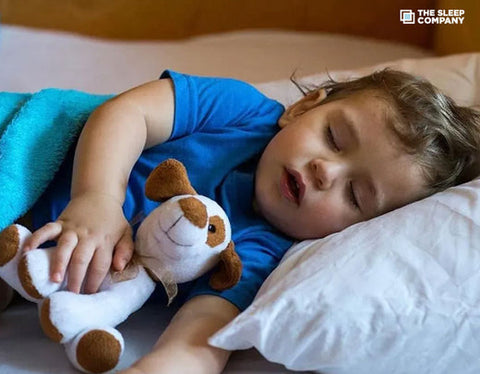My Cart

How to Help Kids Develop a Sleep Routine?

A child picks up new information more quickly than an adult, and the habits we develop as children typically stick with us throughout our lives and are difficult to break. According to research, children typically develop habits by the age of nine; as a result, if you instill in your child a healthy sleeping habit at this young age, it will stick with them for life and have other advantages as well.
Why is it essential to teach a child healthy sleeping habits?

1. As parents, we must first comprehend why it is necessary to infuse healthy sleeping habits in their children at a young age.
2. Sleep is a crucial component of our healthy existence and is more than just lying on a mattress for a night. If we avoid it for a long time, it affects us physically, emotionally, and socially.
3. Also, even while we understand the value of sleep, children do not, and it is up to us to help them understand and use it for their own good.
How can a parent encourage their kid to make excellent sleep habits?
Infants are accustomed to sleeping for over two-thirds of the day. They must stop taking naps throughout the day once they are old enough to attend preschool since their other activities grow and their sleep duration drops to 10–12 hours per day. It gradually drops to 9 to 12 hours at night with no naps during the day.
Nevertheless, if youngsters are not taught to sleep at night in accordance with their circadian rhythm at a young age, their daily routine and life get impaired. Thus, here are some techniques that can help you create good sleeping habits in your child.
Establish a bedtime routine

A bedtime routine for toddlers that includes a warm bath, a tale read aloud while your child is lying on the mattress, and some unwinding time before lights out will help them develop better sleeping habits. When a child becomes a little older, you may make them read to themselves after they learn to read, or you can have a short conversation about their day.
Discipline is important
To remain consistent in their bedtime routine, ensure your child goes to bed at the same time every day, including on weekends and holidays. If you want to build a positive habit in your kid, resist their pleas for “five more minutes.”
As a child gets older, they stop taking daytime naps; however, if your child is older than five and is still doing so, attempt to cut back on their nap duration as it makes it difficult to get to sleep at night. Every child has a different choice for whether they would instead go to bed alone, with siblings, or with a parent, but their sleeping and waking hours must stay the same.
Build a warm and inviting atmosphere
Each of us needs a cozy environment where we can unwind, breathe, and feel protected in order to fall asleep peacefully. For kids, the same holds true. Compared to adults, children have a greater need for this protection and security since they are more likely to become terrified, experience stress, and feel unsafe more quickly.
No spooky tales
A child should, first and foremost, feel protected and secure so that they can sleep soundly. Many kids have trouble falling asleep in the dark because they are afraid of many things. If they behave bravely by sleeping in the dark, try to reward and commend them. Avoid discussing about or watching disturbing movies or television shows late at night. Additionally, a soft light in the bedroom gives your youngster a sense of security.
One should only sleep in their bedroom

Only sleeping should be done in a sleeping area or bedroom; other activities, such as playing games, watching television, or completing homework, should be done elsewhere and away from the bed. Keep enticing objects, such as toys, gadgets, and food, away from the bed or mattress, especially if you have kids, to help them develop a habit of making them associate the bed or mattress only with sleeping.
Bedsheets, a pillow, and a mattress
Teaching kids to become accustomed to their own mattress, pillow, and blanket is preferable since, like adults, kids find their solace in familiarity. A typical behaviour among kids is to wake up at midnight and head to their parents’ bedrooms to fall asleep. However, these tendencies need to be curbed by regularly bringing them to their beds and praising them.
Additionally, the kid mattress should be carefully chosen so that it will protect the child’s spine while supporting its natural curvature.
Cleanliness and room thermostat
According to research, the bedroom should have a low temperature and good hygiene for healthier sleep patterns. In addition to room temperature, some mattress brands in India provide the newest cooling mattress technology, which keeps your body from overheating and helps you sleep peacefully.
No lights or noise
Similar to blue light from displays of televisions, laptops, or mobile devices, bright light disrupts our sleep by suppressing melatonin levels in our bodies and delaying feelings of weariness. Additionally, both loud and persistent noises keep us awake.






























































